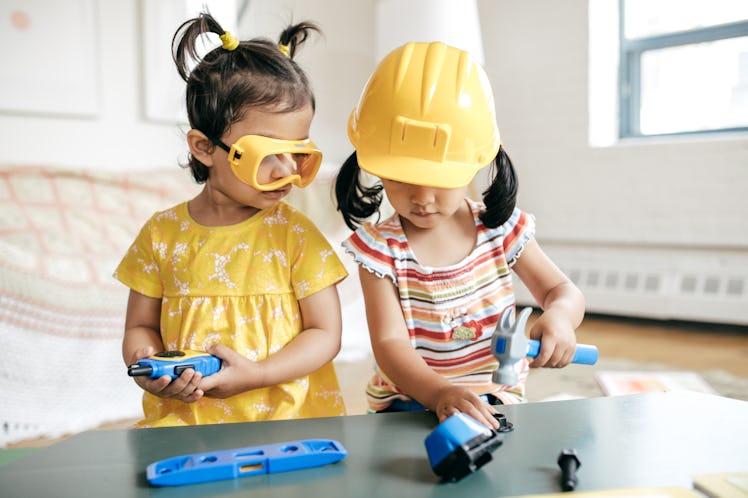How To Help A Child Make New Friends
Kindergarten friendships aren’t something to be shrugged off. Instead, they’re crucial experiences in a child’s development.

Parents might assume that children make friends as naturally as the breathe in and out. After all, kids on a playground will often coalesce into playful groups without provocation. But that doesn’t mean that making friends is always easy for kids, and the bar can be raised even higher when considering how to make friends at a new school. But every school friend a child makes represents an important aspect of their development. Kids are going to spend most of their day around their classmates, so having the emotional intelligence and social skills to make friends is important.
“Throughout childhood and adolescence, we spend much of our time in the company of peers, and children’s social worlds are complicated and fascinating,” says Catherine Bagwell, Ph.D., a professor of psychology at Oxford College of Emory University. She studies children’s social development, especially the significance of their relationships with peers and friends, and is the author of Friendships in Childhood and Adolescence. “There is good evidence that friends and friendships can have profound effects not only on social and emotional development, but also in domains such as mental health and academic adjustment.”
Friendship is an indispensable part of childhood and adolescent development, teaching coping and cooperative skills that children will use for the rest of their lives. “Parents need to recognize that relationships with friends are not mere niceties — that children with good friends have many advantages,” says Bagwell. Her suggestion? Make it a priority to help children be successful in peer relationships.
Obviously, parents can’t really make friends on behalf of their kids. But parents can certainly encourage kids to make friends while also supporting their extracurricular activities and hosting playdates. Parents can help too by modeling good behaviors for their children that allow them to be good friends in their own right.
Sign up for the Fatherly newsletter to get expert advice about fitness, gear, travel, style, parenting, and more in your inbox.
This can contribute more work to an already loaded family schedule, between driving to extracurricular events and hosting playdates. It can be harder if parents don’t even necessarily like these friends. But that’s the point: Successful parenting is about raising a child that can make the right decisions independently.
“Early friendships are among the first experiences that breach the perimeter of parents’ careful control,” says Bagwell. But they aren’t entirely powerless bystanders, either. “Parents can provide an important sounding board for children to talk about their friendships and especially their inevitable friendship challenges. They can invite these conversations and make discussions about peers and friends a regular topic of conversation.”
As kids enter adolescence, these established family conversations will be important, as the nature of their friendships change. Proximity will become less important than shared values, and friends start to lean on each other for emotional and moral support. Kids may be less willing to talk about their friendships, but they still need their parents’ support and advice. Starting these conversations early helps establish this as a habit just as kids need it most.
“As children get older, skills such as engaging in intimate exchanges, sharing and keeping confidences, and being a reliable and supportive partner become increasingly important for high-quality friendships,” says Bagwell. “Parents can talk about and teach these kinds of competencies.”
And even as they distinguish themselves and try to establish independence from their parents, older kids will need their parent’s guidance. Decisions start having more serious repercussions, and peer groups can encourage new habits — parents need to make sure those are good habits.
“Parental monitoring of adolescents’ peer activities is important for positive outcomes,” says Bagwell. “Knowing who their adolescent’s friends are, where they hang out, and how they spend their time together are key aspects of this monitoring.”
How to Support School Friendships
- Friendship is important. Kindergarten friendship may seem arbitrary and capricious, but the social skills it encourages will be important for life.
- Foster friendship. Ferrying a child to extracurricular activities and hosting friends for playdates are concrete ways parents can support early childhood friendships.
- Model good behavior. Kids learn from watching their parents, so they’ll treat their friends the way their parents treat theirs.
- Talk about friendship early. Talk about what it means to be a friend, early and often. That way it will be a habit when friendships evolve to be more emotionally important.
- Make sure friendships are healthy. At every stage, kids can learn bad behavior or be encouraged to act badly by their friends. Make sure both children are improved by a friendship.
This article was originally published on